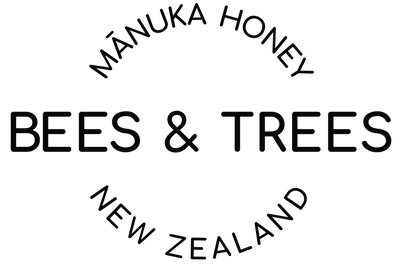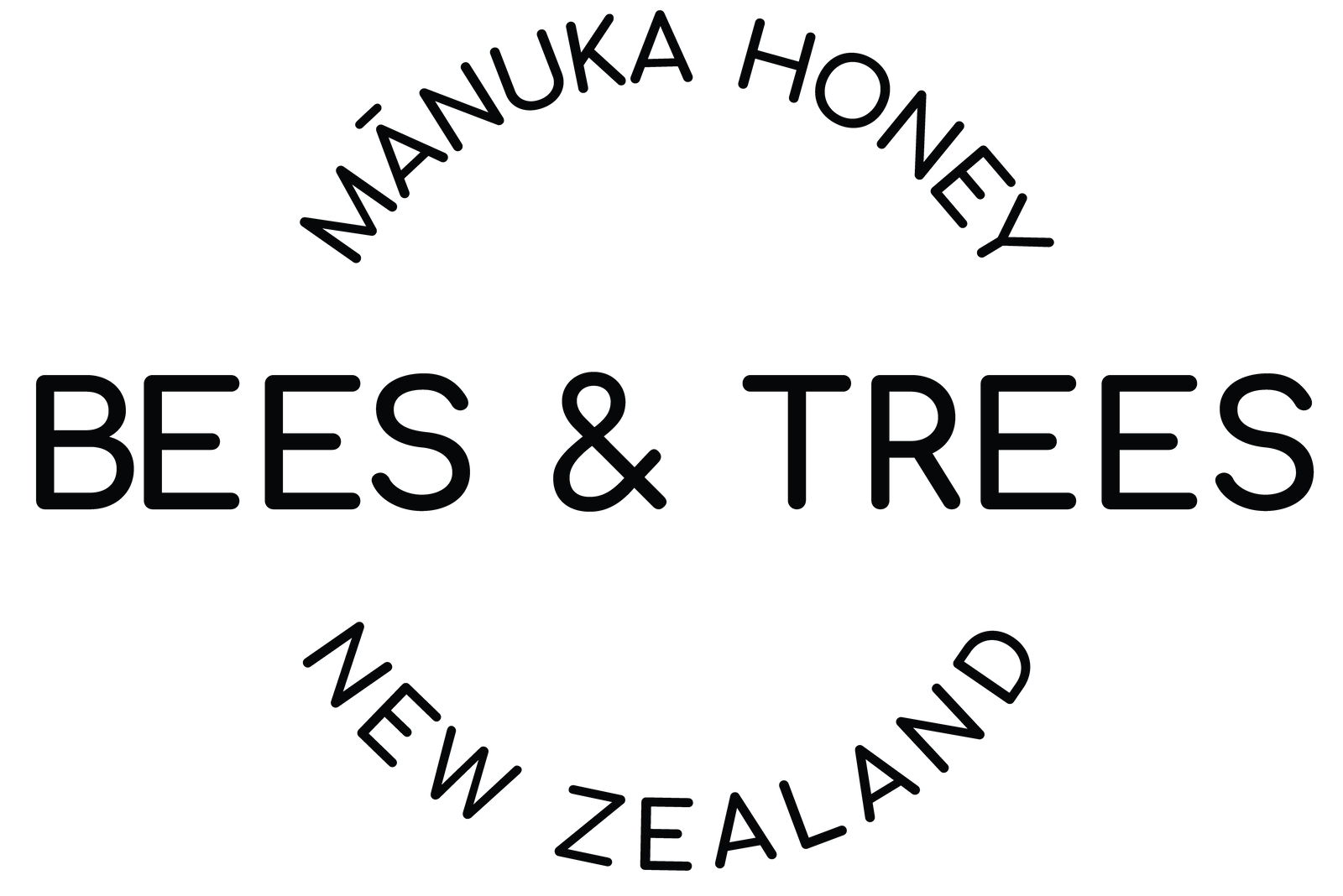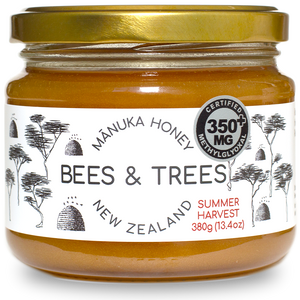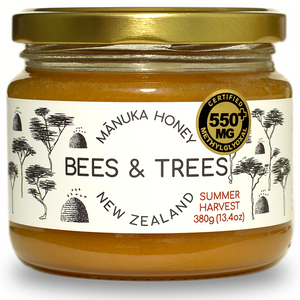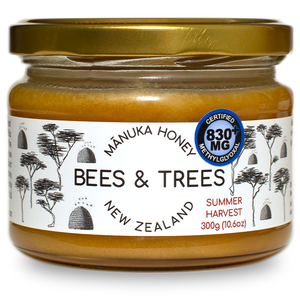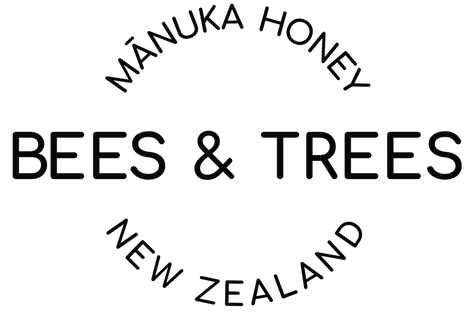Why Manuka Honey?
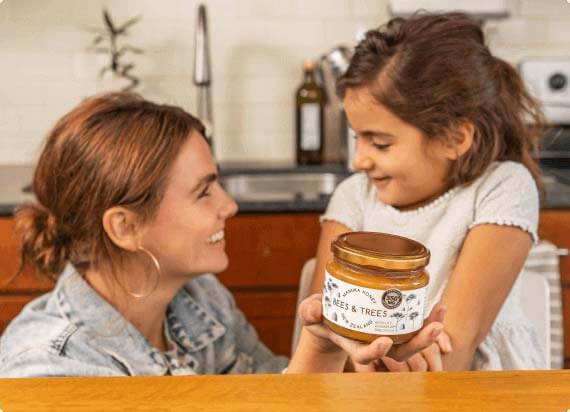
Mānuka Honey is honey made by bees foraging on the nectar of the flowering Mānuka tree, which is native to, and grows mainly in New Zealand. Mānuka honey has been termed a "superfood" for its overall health and wellness properties.
Research performed in New Zealand & in Germany in the 1990s identified a unique and potent antibacterial property of Mānuka honey, methylglyoxal (abbreviated MG or MGO) which stimulated worldwide interest and markets. Active Mānuka honey contains varying degrees of dietary methylglyoxal.
of Mānuka Honey
Historically, until the early 1990s Mānuka honey was just one of many really nice honeys produced from flowering native New Zealand trees. Enter Dr. Peter Molan of the Waikato University in New Zealand, who through his research discovered a very unique and special property of Mānuka honey. Dr. Molan was studying the antiseptic property of honey which is attributed to the production of hydrogen peroxide when the enzyme glucose oxidase, produced by the bees as a honey preservative, comes in contact with moisture on the skin.
However, this peroxide activity is easily destroyed by dilution and exposure to heat and light. The key discovery that Dr. Molan made was that Mānuka honey had a different property, what he termed a non-peroxide activity (NPA). This NPA property was found to be much more potent and stable, opening up the possibility of a wide range of uses. Later researchers in Germany isolated dietary methylglyoxal, a naturally occurring organic compound as directly correlating with this NPA activity.
-Mike Everly, Founder of Bees and Trees
Benefits of Mānuka Honey
Learn why so many people rave about one of nature’s greatest gifts, Mānuka honey!
Immune System Support
Mānuka honey’s anti-microbial properties may strengthen your body’s natural immune defense by fighting off disease and free radicals.
Cold & Flu
An abundance of scientific and anecdotal evidence suggests that Mānuka honey may help reduce symptoms of viral and bacterial infections, and even help you prevent or combat these infections directly.
Gut Health
Mānuka honey’s anti-inflammatory and antibacterial properties may promote healing and sooth digestive tract issues.
Skincare
Mānuka honey kills bacteria and can balance your skin’s pH levels, which may leave you with a healthier and clearer complexion.
Infection and Wound Care
Doctors and hospital emergency rooms around the world embrace Mānuka honey as topical treatment to fight infection and support healing of bodily wounds and burns.
Natural Wellness
Mānuka honey is one of nature’s great superfoods. This amazing natural resource is valued world over for its vast assortment of health and wellness benefits.
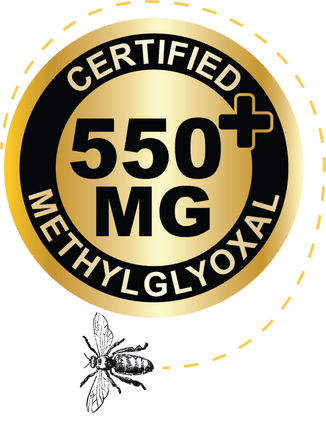
Methylglyoxal (MG) in Mānuka Honey
Professor Thomas Henle at the Technical University of Dresden in Germany set out to isolate what it was in Mānuka honey that was producing this more potent and stable non-peroxide activity. The compound, methylglyoxal (MG or MGO), was isolated as having a direct correlation to the NPA or UMF rating of Mānuka honey. Testing for MG levels has become the industry standard way to gauge the special properties of Mānuka Honey. NPA and UMF ratings are correlated to an actual MG test result.
MG/MGO Testing
Mānuka Honey produced in New Zealand is typically sent to one of two independent labs to be tested for dietary Methylglyoxal (MG or MGO). The value of the honey when sold from producer to packer is directly proportional to this test result. Mānuka honey should either be labeled with the actual MG test results (in mg/kg), or with a correlated rating on the UMF (Unique Mānuka Factor) scale. The UMF trademark must be on the jar if they are using a UMF rating instead of the actual MG test result. Honey labeled with the UMF logo and rating is also tested for two additional chemical markers (HMF & Leptosperin). The relationship between MG & UMF is as follows (after threshold HMF and Leptosperin levels are met):

Reading The Label
When you see anything else on a label of honey purporting to be Mānuka honey, you should steer well clear. Examples of what continues to show up on labels include: Active , Bio-Active , Total Activity , “K Factor plus a number typically ranging from 5+ to 20+. When labeled this way the company is trying to intentionally mislead the consumer into thinking they are getting a high MG (or legitimate UMF) honey when in reality they are typically getting a very low concentration, or low activity (i.e., low MG value) honey. Most consumers are shocked to learn that 80% of the purported Mānuka honey in the US market employ these misleading labeling tactics. You can shop with confidence with Bees & Trees Mānuka honey. We make all of our test reports visible for every batch we produce."
Below are links to research and news reports about Mānuka honey. Each of these links will take you off of our website. We do not take responsibility for the content on the linked sites.
The pace of scientific research into the wellness and healing properties of Mānuka Honey has accelerated in recent years. We review this information regularly and organize what we think are the best and most useful papers here.
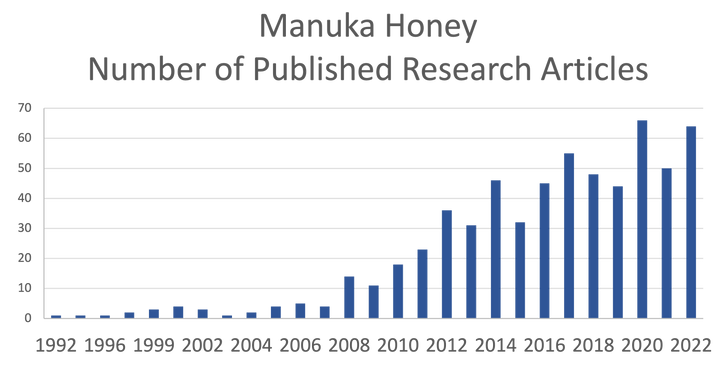
- Science & Medical Research

The pace of scientific research into the wellness and healing properties of Manuka Honey has accelerated in recent years. We review this information regularly and organize what we think are the best and most useful papers here.
- Anti-inflammatory

- Antioxidant

Manuka honey attenuates oxidative damage induced by H2O2 in human whole blood in vitro
Manuka honey protects middle-aged rats from oxidative damage
- Clostridium Difficile (C. diff)

Antibacterial effect of Manuka honey on Clostridium difficile
- Cancer

Oxidative stress, inflammation, and cancer: How are they linked?
- Cystic Fibrosis

Manuka honey to kill drug-resistant bacteria found in cystic fibrosis infections
- Gastric Ulcers, H. Pylori

- Gut

- Immune Support

- Oral Health

Effect of Manuka honey, chlorhexidine gluconate and xylitol on the clinical levels of dental plaque
Antibacterial potential of Manuka honey against three oral bacteria in vitro
The Effects of Manuka Honey on Plaque and Gingivitis: A Pilot Study
- Parasites

- Bacteria and Pathogens

Therapeutic Manuka Honey: No Longer So Alternative
Antibacterial effect of Manuka honey on Clostridium difficile
The unusual antibacterial activity of medical-grade Leptospermum honey: antibacterial spectrum, resistance and transcriptome analysis https://www.anbg.gov.au/leptospermum/leptospermum-scoparium.html
Secondary Bacterial Infections Associated with Influenza Pandemics
Antibacterial activity of Manuka honey and its components: An overview- Viruses

Anti-influenza viral effects of honey in vitro: potent high activity of manuka honey
- Sinusitis

- Wound, Skin Care

Acceptability to patients of a honey dressing for non-healing venous leg ulcers
Resolution of folliculitis decalvans with Medical Honey
Manuka honey‐impregnated dressings in the treatment of neuropathic diabetic foot ulcers
Health Benefits of Manuka Honey as an Essential Constituent for Tissue Regeneration
- Miscellaneous

- News Articles & Medical Reporting

Story about Tom Lloyd, man who credits Manuka honey with saving his leg from rare infection
Discussion about recent research study on use of manuka honey against MRSA & other "superbugs"
BBC 2004 "Harnessing Honey's Healing Power." Dr. Peter Molan
PRWEB March 2012 overview of health benefits of manuka honey
5 Benefits Of Manuka Honey In Ulcerative Colitis
Read on to learn how Manuka honey is made: Click here
Our Manuka and Other New Zealand Honeys
From Our Bees & Trees to a Jar in Your Home.
Laboratory Certified, Pure Manuka Honey.
(Buy 4 or more jars and save 10%)

Mānuka Honey Mid-Activity 350+ MGO/kg
$33.50
Mānuka Honey 350+ MGO/kg | Pure NZ Honey is ideal for health-conscious consumers seeking natural alternatives to incorporate into their wellness routines. This premium Mānuka...
View full product details
Mānuka Honey High-Activity 550+ MGO/kg
$47.50
Mānuka Honey 550+ MGO/kg | Pure NZ Honey is perfect for those looking to experience the remarkable qualities of authentic Mānuka honey. Known for its...
View full product details
Mānuka Honey Founder's Reserve 830+ MGO/kg
$65.00
Mānuka Honey Founder’s Reserve 830+ MGO/kg | Our Founder’s Reserve Mānuka Honey offers an ultra-high 830+ MGO value, making it ideal for those seeking the...
View full product details
Native New Zealand Honey
$15.00
Bees & Trees™ Native Honey | Pure New Zealand Raw Honey is a limited-production honey harvested from New Zealand's untouched native forests. Produced by bees...
View full product details
Mānuka Honey 3 Jar Bundle
$130.00
Looking to try each of our different Mānuka Honey offerings? This bundle is the way to go! Our 350+MGO is great for your daily wellness...
View full product detailsAsk Us
Anything
Have questions about Mānuka Honey
or Bees & Trees?
Send us your question and we'll happily respond!
